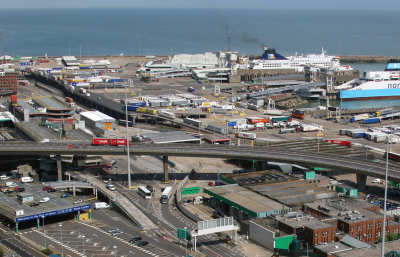Anger as British international haulage threatened by post-Brexit border rules
British international hauliers have expressed frustration at the government’s perceived failure to sufficiently fight their corner with the European Union, as enforcement of the post-Brexit rule which only permits their drivers to spend up to 90 out of every 180 days in Europe’s Schengen Area steps up.
The phased introduction of the new European Entry/Exit System (EES) began on 12 October at ports including Dover and Folkestone. It replaces previous manual checks with a digital approach which requires non-EU citizens to register at the border by scanning passports and providing biometric data – and looks set to lead some British road transport and coach firms operating in Europe to recast their operations.
British-owned transport companies are now looking at re-registering their trucks in nations within the European Union, and employing foreign drivers to handle international work.
While the 90/180 rule has been in place since Brexit, enforcement had previously been limited, having depended on passport stamps being checked manually by EU border officials. It is only now that the technology is being introduced to automatically count the number of days that the driver has spent in the treaty area, in a gradual rollout over the coming months which is expected to be completed by April 2026.
The technology has been long delayed, and had been due to come into use from November 2024 before rollout finally began this month. But attempts by industry bodies such as the Road Haulage Association (RHA) and Logistics UK to win similar exemptions from the regulations enjoyed by air and train crew for truck and coach drivers have so far been in vain.
“The current 90/180 day rule does not support smooth trade between the UK and EU,” Logistics UK said, arguing that an exemption for professional drivers would “ensure they can continue to deliver the goods that businesses and consumers across Europe rely on that help drive growth”.
“Until that happens, drivers must comply with the legislation to ensure there is no disruption to their operations,” the organisation stated.
The system was scheduled to come on stream in Dover on 12 October for coaches, though initial reports suggested that biometric data collection would not begin immediately. Dover Harbour Board was approached for comment but had not responded as we closed for press.
However this week, a Department for Transport spokesperson told Transport Operator: “The EU’s phased roll-out of EES checks has been successful since it was introduced earlier this month, with EES registration for HGV and coaches now having begun at the Eurotunnel and the Port of Dover.”
Long-serving managing director Kevin Hopper headed a management buyout at haulier Brian Yeardley Continental two years ago when the owner retired. The company employs 60 drivers, and 95 per cent of its work is European, including high-profile music tours and motor sport logistics under the TruckingBY brand as well as high-value import and export traffic under the CargoBY brand.
“We got over Brexit, and we got over Covid, but I can’t see how we are going to get through this,” he told Transport Operator earlier this month.
“Most of our drivers are British nationals. We’ve been in business since 1975. Some of our drivers have been with us for 25 years, and some have only ever worked for us on international work since they got their licences.
“Our drivers can be in continental Europe for 14 days or more at a time. Then they are home for two or three days, then off to Europe again. Ninety per cent of their time is spent in Europe. There’s no way they can do only 90 days in Europe out of 180.
“I’m furious. It appears that Boris Johnson’s negotiation team specifically told the EU side that they wanted this rule to apply to the UK, because they didn’t want ‘free movement’.
“How do I tell my drivers who have mortgages, are putting their children through university and have other financial commitments that they can’t keep doing the job they’ve always done?
“It will hit our clients too. They don’t want their work done by a ‘cheap and cheerful’ foreign haulier. I spend £2,000 a week on secure parking for our loads in Europe: they aren’t going to do that.
“Only 15 per cent of the loads travelling between the UK and the EU are carried on British-registered trucks, but those loads are some of the highest value and most sensitive. It won’t do the UK any good if they have to be carried on foreign trucks.
“I can’t switch my drivers to do domestic work: thanks to the big logistics companies the domestic haulage rates are shocking.
“What’s even more shocking is the lack of interest from the government. I had an email from the office of my local MP Yvette Cooper [the foreign secretary] when I tried to raise the issue with her, which said she was ‘too busy’ to discuss it.
“That means she’s too busy to talk about the potential loss of around 100 jobs in her constituency.
“The last thing I want to do is sack my loyal, long-serving drivers and replace them with foreign nationals. That’s not a moral thing to do.”
At the time of Mr Hopper’s comments, he said he had had no response to any of his queries from government, or the Department or Transport (DfT), adding: “Border Force officials at the ports say ‘we don’t know’ when we ask practical questions: for instance, whether data in the form of entry/exit stamps on passports will be transferred into the EES system. The French officials are just as ignorant: they can’t even say when the system will actually go live… The most I’ve had by way of response from our own authorities is ‘we’ll get back to you’. Well, they were saying the same during Brexit, and I’m still waiting to hear from them on that!
“MPs we have contacted are not bothered about this issue, and even our industry bodies seem more concerned about things like cycle safety in London.
“It’s as if no one cares about British drivers. One comment I did hear from an MP was that our survival was down to market forces. Well, it’s not market forces: it’s open discrimination against British citizens, British taxpayers. Out well-paid drivers pay lots of tax, why isn’t the government protecting them?
“The irony is that talking to a representative from the International Road Transport Union, it appears that the EU would be amenable to a request for reform from the UK government: it’s the UK government that is not prepared to even try to help us.”
Chris Bird, managing director at C J Bird Transport Ltd in south Wales, said: “It’s going to be a massive problem for all UK international operators, unless they have drivers with EU passports.
“I’m looking at opening a satellite depot to base trucks in Ireland or Holland and getting work permits to get around it while still employing my regular drivers.
“It’s been in the offing for years, and I’ve been talking to my MP about it for at least 12 months in the hopes of getting meetings with the relevant government departments…
“I don’t think the government realises the full impact that the EES will have not just on the transport industry, but on the economy and road safety. It gives a distinct commercial advantage to foreign trucks, which will be able to visit the UK for relatively short periods to deliver their import loads, and they may well undertake a cabotage load or two while they are here before leaving with an export load that could have been on a British truck.
“That means fewer British trucks on the road, and less revenue for the government. It also means more potentially under-maintained heavy vehicles on the road… That puts all British hauliers, and not just the international ones, at a commercial disadvantage.
“In my opinion, the British government should be asking the EU to extend the train crews’ exemption to truck drivers. If the EU won’t play ball, then the UK should unilaterally impose a £50 a day vignette charge on incoming trucks until it does.
“I don’t think the government has grasped either the importance or the urgency of the situation.”
Toby Ovens, director of Wiltshire-based Broughton Transport, said the only way to mitigate the situation was to hire European drivers in preference to British citizens for the international journeys which make up 50 per cent of his company’s work.
“It’s not easy to change things around operationally to suit the new regulations,” he admitted.
“Hope that a political solution can be found is fading,” he said. “I’ve been to Westminster a few times to discuss the situation, and I’m not filled with confidence.
“However, I don’t anticipate too many difficulties in recruiting EU citizens as drivers: we get enquiries from French, Belgian and Dutch citizens asking for work as well as Eastern Europeans. We are paying wages comparable with those on offer in western Europe.
“We are also looking at flagging-out some trucks to Belgium, as most of our traffic is over the water.
“It’s a sad state of affairs. There is no logic about the situation coming from government, and they won’t stand up for the UK. But to be fair, I can’t say the Conservatives were much different.”
Responding to the hauliers’ comments, the DfT spokesperson told us: “Amendments to Schengen rules are a matter for the EU, but the government will continue to listen to concerns raised by sectors affected by these rules and will advocate for British citizens abroad.”
DfT said it was continuing to encourage road haulage and coach operators to take the necessary steps to ensure that their UK national drivers who work internationally remain within the 90/180-day limit.













